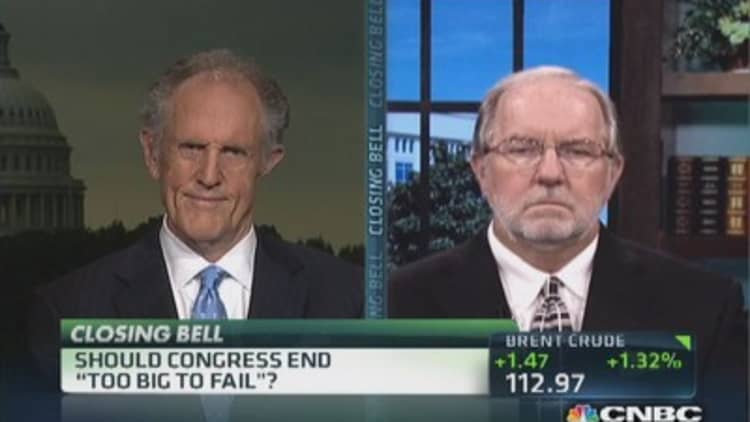Lehman Brothers became the face of the financial crisis when it collapsed on Sept. 15, 2008, but the underlying ugliness was the near-implosion of the multitrillion-dollar money market industry.
On Sept. 16, the Reserve Primary Fund suffered the ultimate peril for its line of business—the "breaking of the buck," or the violation of the underlying premise that a dollar put in a money market was safe from harm, whatever the turbulence of the global financial waters.
A day later, Putnam Funds said it was shuttering its $15 billion institutional Putnam Prime Money Market fund, sending chills that a run on the banks would be next.
That run never happened, as regulators expanded insurance on bank deposits and the panic abated.
But a lingering question from the crisis' darkest days is whether such an event could happen again and trigger far more widespread panic than it did during those dark days.

(Read more: Was Lehman failure really 'best and only outcome?')
Regulators since have been laboring to shore up the industry, and there's optimism that money market cash would be safe in the case of market liquidity evaporation similar to the Lehman crisis.
"The steps that we're taking to stabilize the money market industry and money market funds in the wake of the breaking of the buck and Lehman collapse have been remarkably successful," said John Taft, CEO at RBC Wealth Management, which oversees $235 billion for clients.
"It was one of the true emergency-room interventions in the financial markets that didn't cost any money but prevented a problem from becoming much worse," he added.
Yet questions remain over whether the $2.6 trillion industry is truly isolated from further attacks.
Large funds remain resistant to relatively modest reform proposals from the Securities and Exchange Commission, including floating share prices or setting aside enough capital to ensure the buck will never be broken again, as it has on only two occasions.
(Read more: Mom and pop still don't believe in this market)
A risk-taking climate remains, however, and some fear another shock to the system.
"Money market funds lack safety relative to other safe instruments, such as bank deposits or Treasury bills, because they have strong incentives to take on risk when the opportunity arises but they are vulnerable to runs once the risk materializes," Marcin Kacperczyk and Philipp Schnabl said in a money market stability study for the Stern School of Business at New York University.
The study showed just how huge the stakes are in the money market game.
Ensuring deposits, which halted a potential bank run, put the government on the hook for $3 trillion in fund asset holdings, the NYU study said. Therefore, avoiding having to deliver on such a guarantee poses a big problem for regulators.
"We're a long way from seeing any kind of specificity and resolution around the reforms," Taft said. "But it does feel like there will be some additional structural reforms, and they're likely to be reasonable and appropriate." Determining how much should be done is the hard part, he added.
(Read more: Crisis cost up to $14 trillion, Dallas Fed says)
"We know we've moved 100 different chips from the growth side of the table to the stability side of the table, and we know that we're only 40 percent of the way done with Dodd-Frank" reforms, he said.
"If I were chairing the Financial Stability Oversight Council, the first thing I would requisition is a study on how high a levee we have built and how much higher is it going to be built and is the cost worth the benefit when it comes to protection from future crises," he said. "The levee wasn't high enough and was full of holes. There's no question we had to go about repairing it. If you ask me should we do more, I don't know."
—By CNBC's Jeff Cox. Follow him @JeffCoxCNBCcom on Twitter






